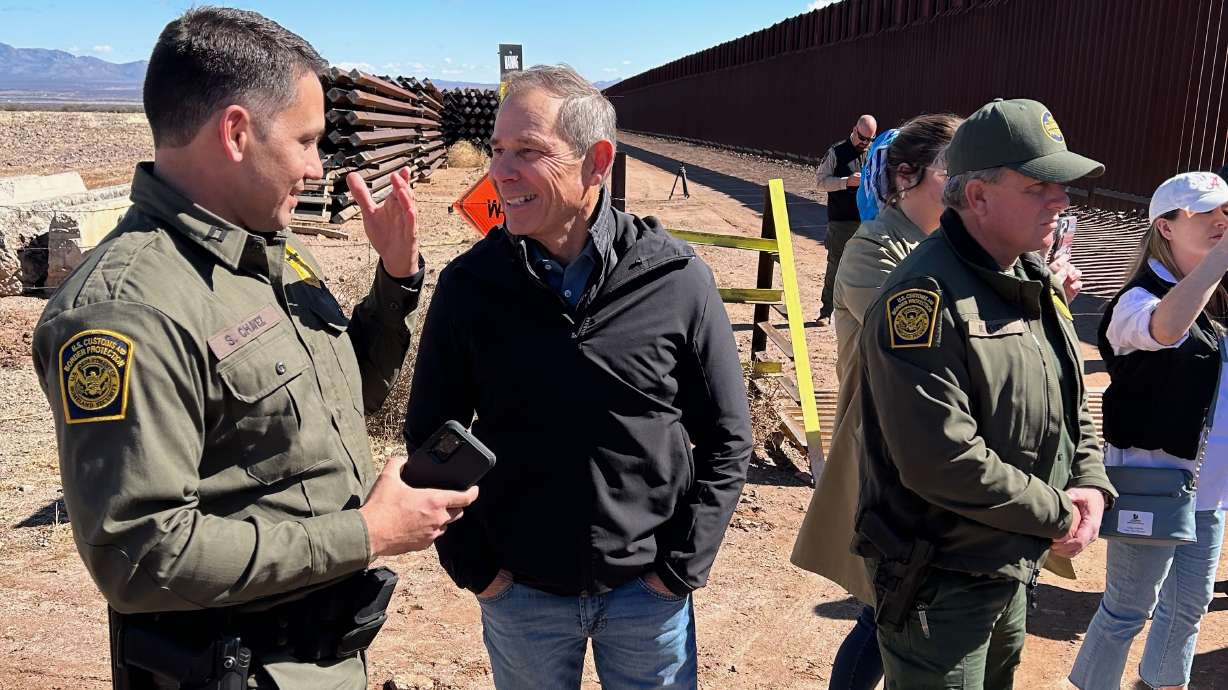Estimated read time: 4-5 minutes
This archived news story is available only for your personal, non-commercial use. Information in the story may be outdated or superseded by additional information. Reading or replaying the story in its archived form does not constitute a republication of the story.
SIERRA VISTA, Arizona — With the U.S.-Mexico border a long way from Utah, U.S. Rep. John Curtis put the question to a leader of the National Border Patrol Council, Art Del Cueto.
"Could you help Utahns understand why this impacts them and how this impacts them?" Curtis asked, speaking Thursday during a field hearing in Sierra Vista, Arizona, on the border situation.
"Because the drug cartels are not just operating here. They're not just making their money off of what they sell on our southern border or in border states. They're making their money off what they sell in the entire country," including Utah, answered Del Cueto, who testified at the hearing. The National Border Patrol Council is a labor group representing border patrol agents and Del Cueto is a leader in the organization.
Indeed, the biggest takeaway for him from the trip, Curtis later told KSL.com in a phone interview, is that the U.S. government doesn't control the southern border, thus allowing for entry of fentanyl and other drugs. Republicans, including Curtis, blame the administration of President Joe Biden, a Democrat.
"I came today with a specific purpose — to learn about the control of the border. And what I learned is that the border is controlled — not by the U.S. government, but by the (drug) cartels. They control who comes; they control when they come and where they come into the United States," said Curtis, who represents Utah's 3rd District.
As inadequate security and a surge in numbers of people trying to illegally enter the United States from Mexico sizzles as an issue and U.S. lawmakers struggle to fix the problem, Curtis traveled to the border to get a firsthand look at the situation. He visited with 12 other Republican U.S. House members, making his third border trip.
The impact of the drugs making it across the border, Curtis said, is perhaps the biggest problem Utah faces as a result of inadequate security. "We have seen that in Utah. The (Utah) Highway Patrol has some staggering statistics about the increase in fentanyl and fentanyl-related deaths," he said.
Stats released just last week by the U.S. Drug Enforcement Administration underscore the fentanyl problem. Fentanyl seizures last year in Utah, Colorado, Montana and Wyoming amounted to around 3.4 million pills, 664,200 of them in Utah, up from 1.9 million pills in 2022 in the four states and 565,200 in 2021, according to the data. The bulk of the fentanyl comes from two Mexican drug groups, the Sinaloa and Jalisco cartels, and fentanyl is "now the leading cause of death for Americans" aged 18-45, the DEA report said.
"The criminal cartels, these organized transnational organizations, are destroying our country one pill at a time, one entry at a time," said Mark Dannels, the Cochise County, Arizona, sheriff and another witness who spoke at Thursday's field hearing.
U.S. Rep. Tom Tiffany, R-Wisconsin, the leader of the hearing, said fentanyl kills 70,000 people in the United States a year.
"It's not hard to understand how all that fentanyl is pouring into our country when the border checkpoints are not manned because they're off having to do other things," he said. Under Biden, he charged, "the situation has spiraled completely out of control."
The U.S. Senate on Wednesday rebuffed a plan crafted by Republicans to bolster border security. Going forward, Curtis said, coming up with a plan to address the issue could be difficult, even if the problem is dire.
"That's a hard question," he said, pondering the prospects of legislation that can muster enough Democratic and Republican support to pass. "I'm an optimistic guy. I think it's fair to say the odds are stacked against it, but it won't keep me from trying."
He thinks HR2, a border security measure approved by the U.S. House last May, could be a starting point. The measure, still to be considered in the U.S. Senate, would impose limits on asylum eligibility and calls for renewed efforts to build a wall along the U.S.-Mexico border. More generally, Curtis calls for a return to the "remain in Mexico" policy implemented under former President Donald Trump, which required asylum seekers to stay in Mexico while their requests were processed.
"My suspicion is many in the Senate, Senate Republicans, would like HR2," Curtis said. "It's the only thing that's passed one of the bodies, so it's a great starting point."
Gov. Spencer Cox visited the U.S.-Mexico border in Texas last Sunday with 13 other Republican governors, lamenting the state of border security. U.S. Reps. Celeste Maloy and Burgess Owens, who represent Utah's 2nd and 4th Congressional Districts, respectively, visited the border at Eagle Pass, Texas, on Jan. 3.









